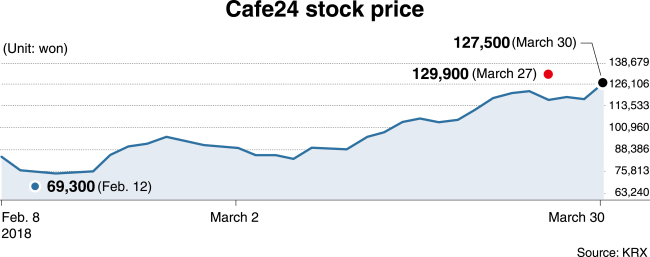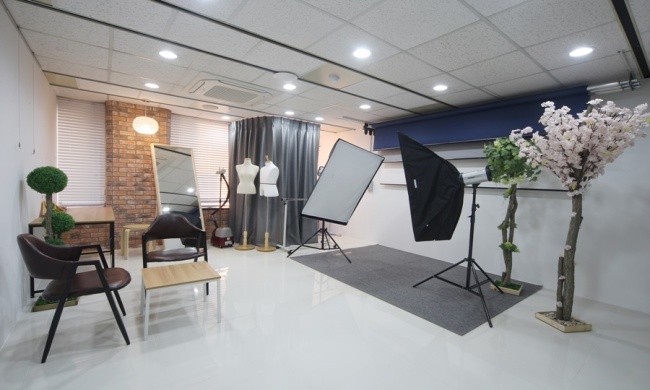This is the 53rd in a series of articles analyzing major companies traded on the tech-heavy Kosdaq market. — Ed.
Profitability is undeniably the key prerequisite for a firm seeking an initial public offering on the second-tier Kosdaq market.
Showing a stable income has long been the clearest signal for market operator Korea Exchange and other relevant financial authorities to predict an IPO-aspirant company’s stock performance.
But with changes in the speed and characteristics of the tech-savvy market, the financial authorities have recently allowed IPO-seeking firms to go through an alternative to such requirements, locally-dubbed the “Tesla policy.”
Through a high-profile IPO attempt late last year, Cafe24 became the first company to be listed on Kosdaq without meeting profitability requirements.
As an e-commerce technology provider dedicated to online fashion malls, its revenue has been overshadowed by investment expenses, leading to net loss and operating loss for five consecutive years until 2016.
But the firm — a Korean equivalent to Canadian e-commerce firm Shopify — managed to go public on Feb. 8 thanks to the state-sponsored policy.

Since then, Cafe24 has shown stellar growth in the market for the past two months. Cafe24 on Friday closed at 127,500 won ($120), up 7.4 percent from the previous trading day. This is more than double that of its offering price at 57,000 won fixed in January.
For the past 20 trading days, the share price jumped 41 percent, while the foreign ownership ratio soared to 13 percent on Friday, from 4.6 percent 20 trading days before.
Also on Friday, Cafe24’s market cap came to 1.13 trillion won, the 31st-largest in the stock market home to some 1,200 companies.
Cafe24 touches on a variety of aspects of internet solutions for online fashion shops in its business. The commission fee for such solutions, ranging from payment gateway, domain addresses, messaging services to a platform that allows store owners to create a multi-language website, are major sources of revenue. Cafe24 also plays the role of online advertisement agency and web hosting agency, another source of income through commission fees.
Separate from this, Cafe24 operates centers for entrepreneurs or aspiring founders that offer training programs on market analysis, taxation, trademarks and copyright. Also, the company runs 30 shared office spaces that accompany photography studios.
Cafe24 has provided such solutions to some 1.5 million online shopping malls as of 2017, while some 67,500 of them are devoted to foreign direct sales of fashion products.
Over 90 percent of its net income has stemmed from the domestic market, home to Korean online women’s fashion brand leaders such as “IMVELY,” “Mixxmix” and “HOTPING.”
 |
An internal view of SOHO Business Center, Cafe24's shared working space. (Cafe24) |
Kim Kyu-ri, an analyst at Shinhan Financial Investment, wrote in a recent note that time is ripe for Cafe24 to start seeing profits, while major investments — mostly workforce expansion — were completed last year.
Kim projected the operating margin ratio would stand at 11.4 percent in 2018, while the net profit would rise 19.1 percent on-year.
Founded in 1999, the company has been in the red from 2012 to 2016. Without the Tesla policy, Cafe24 would have been unable to prove its eligibility to go public. Traditionally, a firm had to submit its proof of decent performance -- when it comes to such issues as net profit or return-on-equity -- least 2 billion won in yearly net profit a year prior to the application or recorded return-on-equity at 10 percent.
The operating losses originated from “increase in costs from overseas expansion,” according to Kim, citing sales-to-administrative expense ratio that averaged 101 percent from 2013 to 2016 and a decrease in the ratio to 81.5 percent in 2017 and 75.3 percent in 2018.
With the Tesla policy, introduced in December 2016, Cafe24 was able to skirt IPO requirements and instead turned to three prerequisites -- market cap, continued revenue increase and the absolute volume of revenue -- for firms without profit.
When it applied for an IPO through listing in October 2017, the market cap topped 400 billion won on Korea’s over-the-counter market, far exceeding the minimum requirement at 50 billion won. Its revenue grew 20.4 percent on average for two years — 17.9 percent in 2015 and 22.9 percent in 2016 — exceeding the requirement at 20 percent. Also a year prior to application, its net sales came to 101.9 billion won, above the minimum requirement at 3 billion won.
Cafe24 gained a preliminary approval by the KRX in December, and it took another two months to have the firm listed on Kosdaq.
This year, Cafe24 hinted that it will primarily target the Japanese market, where the firm observed an increased demand for Korean fashion products through direct sales online.
By Son Ji-hyoung
(
consnow@heraldcorp.com)








![[Today’s K-pop] Blackpink’s Jennie, Lisa invited to Coachella as solo acts](http://res.heraldm.com/phpwas/restmb_idxmake.php?idx=644&simg=/content/image/2024/11/21/20241121050099_0.jpg)
